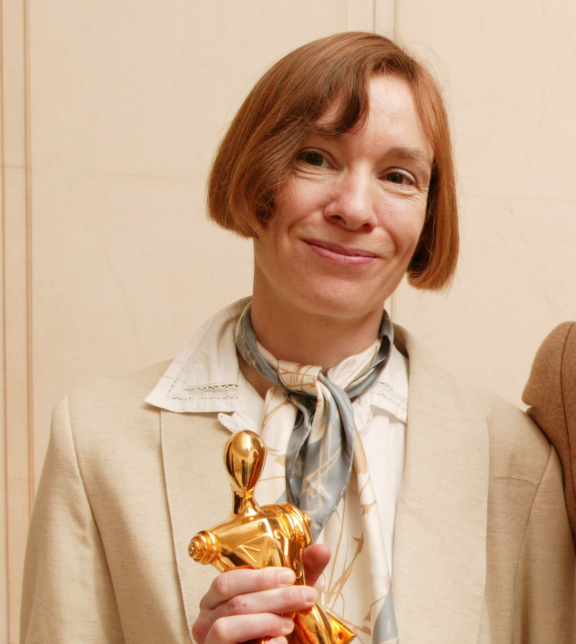Anne Ridley Inflammatory diseases and cancer: the role of cell migration
Anne Ridley, Head of the School of Cellular and Molecular Medicine, University of Bristol University of Bristol's website
- 2004 • Liliane Bettencourt Prize for Life Sciences

Cell migration plays an essential role in wound repair, as well as in immune and inflammatory responses. Anne Ridley has demonstrated that a dysfunction in these migration processes can promote the spread of cancer and the onset of chronic inflammatory diseases.
The endothelium and immune cell mobility
To fight pathogens and cancer, our immune cells are constantly circulating throughout the body, and particularly through the bloodstream. Their mobility presupposes changes in their morphology and the permeability of the cellular barriers that are crossed, such as the endothelium.
The endothelium, a monolayer of cells which lines all blood vessels, controls vascular permeability, as well as inflammatory and immune responses.
However, this control of cell migration can malfunction, promoting the spread of cancer or the onset of inflammatory diseases.
Migration mechanisms of cancer cells and leukocytes
By crossing the endothelium, tumour cells enter the bloodstream and spread throughout the body, metastasising in parts of the body far away from the original tumour.
In addition, endothelial dysfunction can promote pathological chronic inflammation.
Anne Ridley’s research team has characterised the mechanisms via which both cancer cells and leukocytes (i.e. white blood cells) cross the endothelium and circulate throughout the body.
Immune cells can squeeze between endothelial cells or pass directly through the cells themselves. In contrast, cancer cells permanently anchor themselves to the endothelial barrier.
Role of Rho GTPases in cell migration
Anne Ridley has also identified a family of proteins that play a key role in cell mobility and endothelial permeability: Rho GTPases. In particular, they affect the cytoskeleton, the intracellular skeleton that determines the architectural and mechanical properties of cells.
Through genome sequencing of various human tumours, it has been possible to observe the altered gene expression of several Rho GTPases. These proteins may therefore be promising therapeutic targets.
Through the the Liliane Bettencourt Prize for Life Sciences, the Fondation Bettencourt Schueller wanted to support this innovative research, which could lead to new therapeutic treatments for cancer metastasis and chronic inflammatory diseases.
Anne Ridley in a few words
After studying biochemistry at Cambridge University, Anne Ridley completed a PhD on the regulation of oncogenes in Schwann cells, the glial cells that surround neurons. While conducting research at the Imperial Cancer Research Fund, she demonstrated that tumour formation depends on cooperation between different oncogenes.
Through her post-doctoral research at the Whitehead Institute, Cambridge, she discovered the role of Rho GTPases in cell migration via the endothelium.
As a Professor of Cell Biology at King’s College London, and then Head of the School of Cellular and Molecular Medicine in Bristol, Anne Ridley is continuing her research into cell migration and helping to deepen our understanding of cancer progression and inflammation.
-
1989 PhD in Biology, University of London (UK)
-
1989 Post-Doctoral Fellowship at the Whitehead Institute, Massachusetts Institute of Technology, Cambridge (USA)
-
1990 Post-Doctoral Fellowship at the Institute of Cancer Research, London (UK)
-
1993 Head of the Cell and Molecular Biology Laboratory, Ludwig Institute for Cancer Research, University College London (UK)
-
2000 Hooke Medal, British Society for Cell Biology
-
2004 Liliane Bettencourt Prize for Life Sciences
Liliane Bettencourt Prize for Life Sciences
The Liliane Bettencourt Prize for Life Sciences rewards each year a researcher under the age of 45 for the excellence of their work and their remarkable contribution to their field of scientific research. This prize is awarded, depending on the year, to a researcher based in France or working in another European country. Thirty winners have been awarded since 1997. From 2023, prize rewards the laureate up to 100,000 euros.
All the award-winners